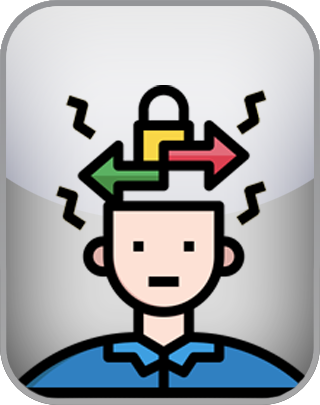Obsessive-Compulsive Test (OCI-R)
The Obsessive-Compulsive Inventory-Revised (OCI-R) is a brief self-report tool used to assess the severity of obsessive-compulsive symptoms across six dimensions, including washing, checking, hoarding, and ordering. Developed by Foa et al. (2002), it is widely utilized in clinical and research settings for screening OCD symptoms, understanding their impact on daily functioning, and monitoring treatment progress. Its reliability and ease of use make it a valuable resource for identifying and addressing OCD-related behaviors.
To take the test, enter your input below.
Question 1 of 18
I feel compelled to count while I am doing things.
| Disagree | Agree |
NEXT
The IDRlabs Obsessive-Compulsive Test was developed by IDRlabs, based on the Obsessive-Compulsive Inventory (OCI-R).
Obsessive-compulsion refers to a pattern of intrusive, unwanted thoughts (obsessions) that trigger significant anxiety and lead to repetitive behaviors or mental acts (compulsions) aimed at reducing that distress. These behaviors are often irrational and not directly related to the feared outcome, yet individuals feel driven to perform them. Obsessive-compulsion is the hallmark symptom of Obsessive-Compulsive Disorder (OCD), though it can also occur in other conditions like body dysmorphic disorder or tic disorders.
Obsessions are persistent, intrusive thoughts, images, or urges that cause significant distress or anxiety. Common themes include fear of contamination, harm to oneself or others, symmetry, or taboo thoughts. These obsessions are involuntary and often distressing, even when individuals recognize them as irrational. The severity of obsessions can vary widely, but they typically interfere with daily functioning, concentration, and emotional well-being.
Compulsions are repetitive behaviors performed in response to an obsession or according to rigid rules. Examples include excessive handwashing, checking, counting, or mentally "neutralizing" an intrusive thought. While these actions temporarily reduce anxiety, they reinforce the cycle of obsession and compulsion, ultimately exacerbating the disorder. Over time, compulsions can become time-consuming and debilitating.
Obsessive-compulsion significantly disrupts an individual’s life, affecting relationships, work, and self-esteem. The constant battle with intrusive thoughts and the time spent performing rituals can lead to emotional exhaustion, social withdrawal, and functional impairments. Without intervention, this pattern often worsens, leading to increased isolation and comorbid mental health conditions, such as depression or generalized anxiety disorder.
Effective treatment for obsessive-compulsion typically involves a combination of cognitive-behavioral therapy (CBT) and medication. Exposure and Response Prevention (ERP), a form of CBT, helps individuals confront obsessions and resist performing compulsions, breaking the cycle of anxiety and reinforcement. Selective serotonin reuptake inhibitors (SSRIs) are the most commonly prescribed medications and can reduce the intensity of symptoms. Early intervention and consistent treatment are critical to improving outcomes and restoring quality of life.
As the publishers of this free test, which allows you to screen yourself for obsessive-compulsion, we strive to make the test as reliable and valid as possible by subjecting this test to statistical controls and validation. However, free online quizzes such as the present test do not provide professional assessments or recommendations of any kind; the test is provided entirely “as-is.” For more information about any of our online tests and quizzes, please consult our Terms of Service.
References
- Foa, E. B., Huppert, J. D., Leiberg, S., Langner, R., Kichic, R., Hajcak, G., & Salkovskis, P. M. (2002). The Obsessive-Compulsive Inventory: Development and validation of a short version. Psychological Assessment, 14(4), 485–496.

